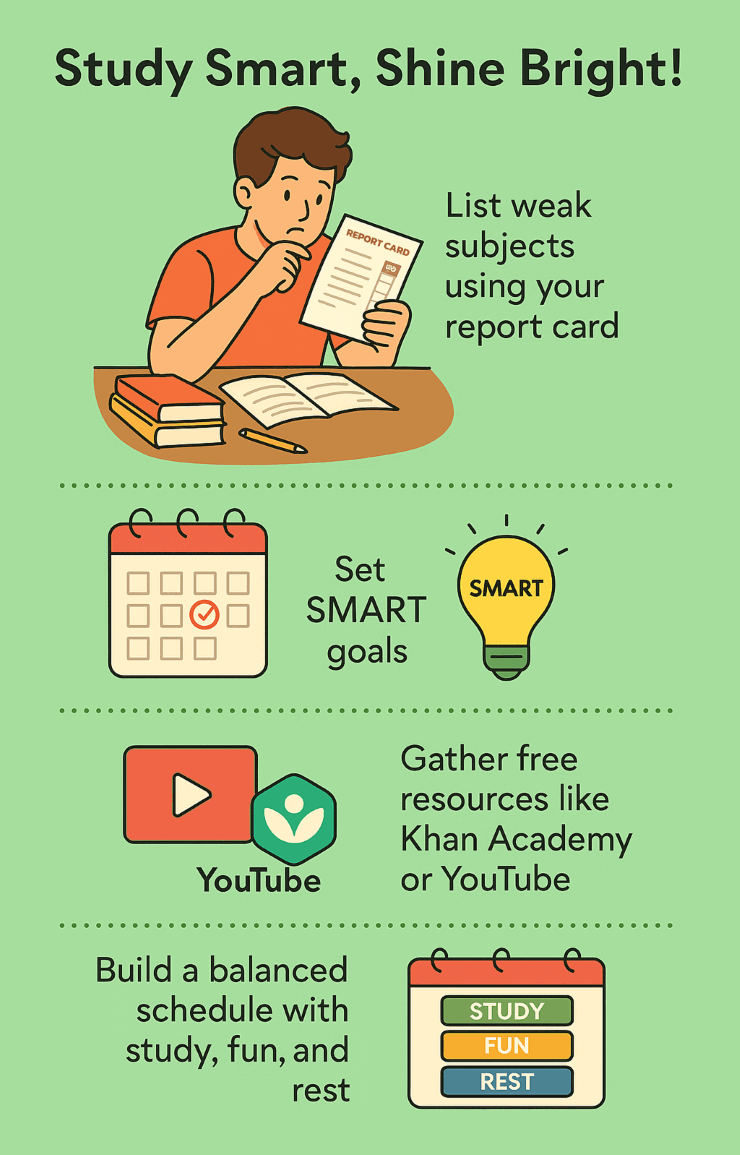Summer’s here, and while your friends are binge-watching shows or hitting the beach, you’re wondering: how can you make this break count for your grades? Knowing how to study in summer can transform your academic game. Instead of coasting, you can tackle weak subjects, sharpen skills, and head into fall with confidence. With free resources, our Grade Improvement Calculator, and a solid plan, you’ll boost your GPA while still enjoying summer’s vibe. This guide dives deep with steps, advices, and an Infographic: How to Kickstart Your Summer Study Plan to keep you motivated. Let’s make this summer your launchpad to academic stardom!
A purposeful plan is the backbone of how to study in summer. It’s about targeting weaknesses, setting goals, and balancing study with fun. Dr. Lisa Chen, an education consultant, says, “Summer is a low-pressure time to rebuild confidence in tough subjects.” Use free resources and a clear strategy to stay on track without burning out.
Start by pinpointing subjects where your grades dip—maybe math or writing. Review your last report card or use our Grade Improvement Calculator to forecast your grade improvements. For example, Mia, a junior, saw her C in chemistry and decided to focus there. “I knew I had to fix it before AP Chem,” she says. List 1–2 subjects to target, ensuring your plan is manageable.
SMART goals (Specific, Measurable, Achievable, Relevant, Time-bound) give your summer study structure. Instead of “get better at math,” aim for “complete 50 algebra problems by July 15.” Dr. Chen advises, “Clear goals keep students focused.” Mia set a goal to master chemical reactions by August, using Khan Academy’s free videos. Align goals with your college aspirations, as seen in Summer Programs That Strengthen Your College Apps.
Free tools make summer study accessible. Khan Academy offers math and science lessons, while Coursera has free courses for advanced learners. Libraries provide e-books for summer reading to prep for fall. Mia used YouTube tutorials for chemistry labs, saying, “They made concepts click.” List 3–5 resources per subject and bookmark them for easy access.
How to study in summer doesn’t mean all work, no play. A balanced approach boosts productivity and mental health. Dr. Michael Torres, a high school counselor, notes, “Students who balance study and relaxation retain more.” Create a schedule that leaves room for both learning and living.
The Time Blocking method assigns specific hours to tasks, preventing overwhelm. Schedule 1–2 hours daily for study, leaving afternoons for fun. Mia blocked 9–11 AM for chemistry, then swam with friends. “I felt productive and relaxed,” she shares. Use a planner to map study, hobbies, and rest, a tactic to manage summer academic workloads.
Time Blocking Tips:
Mental health is critical for summer study balance. Overworking leads to burnout, so weave in self-care. Dr. Torres suggests, “Daily mindfulness keeps stress low.” Try 10-minute meditation or journaling. Mia took short walks to clear her mind, boosting her focus. Explore fun summer science experiments to make learning engaging and stress-free.
Blend study with enjoyment to stay motivated. Watch documentaries on your subject or join online forums like Reddit’s r/learnmath. Mia did virtual chemistry labs, saying, “It felt like a game, not homework.” This approach aligns with designing a summer skill-building plan, keeping your summer vibrant.
Solo study can feel isolating, so tap into support and monitor your progress. Connecting with mentors and tracking grades ensures you stay on course while building confidence.
A mentor can guide your summer study. Reach out to teachers or join online communities, as suggested in Finding a Summer Mentor to Guide Your Academic Journey. Mia emailed her chemistry teacher for resource tips, which clarified tough concepts. Dr. Chen says, “Mentors provide direction and accountability.” Schedule biweekly check-ins to stay focused.
Use the Pomodoro Technique (25-minute study sessions with 5-minute breaks) to maintain focus, and check progress weekly. Mia tested herself with practice quizzes, adjusting her plan when needed. Our Grade Improvement Calculator helped her predict how her efforts would lift her chemistry grade. If you’re worried about slipping grades, check steps to recover from low grades.
Acknowledge progress to stay motivated. Finished a math unit? Treat yourself to ice cream. Mia celebrated mastering chemical equations with a movie night. Dr. Torres notes, “Small rewards fuel long-term success.” Track milestones in a journal or app to see your growth, reinforcing your summer study plan.

This infographic outlines a 4-step process to launch your summer study:
Studying in summer is about strategy, balance, and support. Mia’s journey from a C to a B+ in chemistry shows how a targeted plan, free resources, and mental health care pay off. Craft your plan, set SMART goals, balance study with fun, and lean on mentors while tracking progress with our Grade Improvement Calculator. Your summer can transform your academic future. Want more tips to boost your grades with our calculator? Start your self-directed study now and head into fall ready to soar!